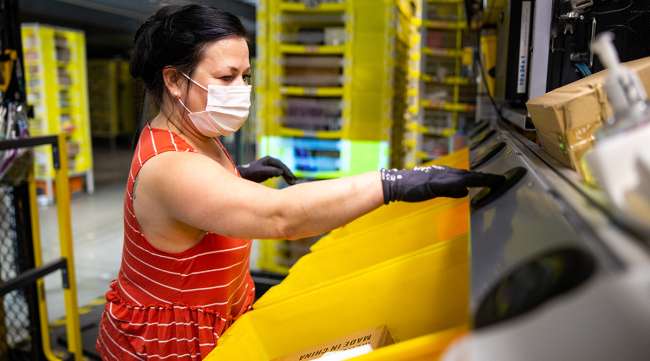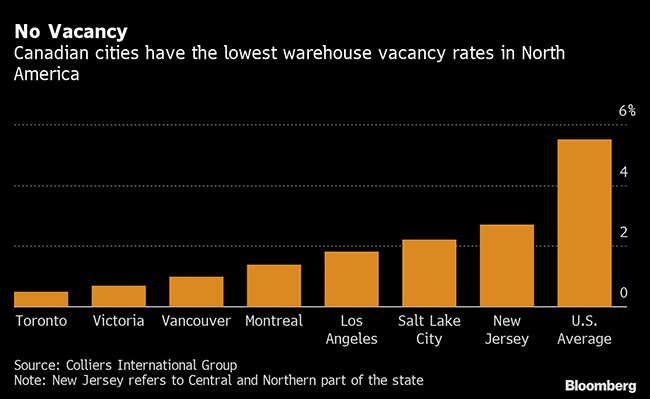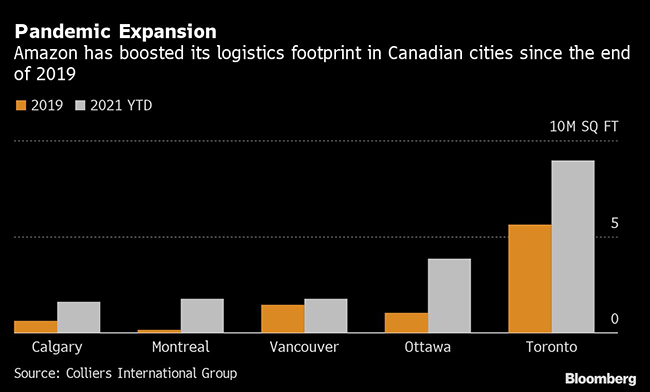Bloomberg News
Amazon Fuels Canada’s Severe Warehouse Shortage

[Stay on top of transportation news: Get TTNews in your inbox.]
Finding warehouse space around Toronto has never been harder, and the e-commerce-fueled shortage is disrupting businesses and threatening the broader economy.
With the pandemic driving a belated embrace of online shopping in Canada, Amazon.com Inc. has been gobbling up warehouses. That has pushed the vacancy rate in the Toronto area down to just 0.5%, making it the tightest market in North America, if not the world.
Logistics consultant Richard Kunst is seeing the fallout firsthand, as companies try to fill orders and move merchandise. One client, a food manufacturer, has been forced to pack roughly a third of its orders in a parking lot. Others are so desperate for warehouse space Kunst has advised they ask local farmers if they can keep goods in their fields.
“It’s cheaper to go to a farmer and say, ‘Tell me how much you’re going to make off a crop on a five-acre lot, and I will pay you that, plus 10%, in order to drop containers here,’ ” Kunst said.
While the warehouse shortage is most acute in Toronto, other major cities in Canada aren’t far behind, with Victoria, Vancouver and Montreal rounding out North America’s top four tightest warehouse markets, according to real estate brokerage Colliers International Group Inc.

The single-biggest driver of this squeeze has been Amazon.com. The pandemic has seen the e-commerce giant increase its logistics footprint by nearly 12 million square feet across nine major Canadian markets since the end of 2019, according to Colliers.
That includes taking a quarter of all the space that came up for lease in Toronto last year, while boosting its footprint 10 times in Montreal and quadrupling in Ottawa.
With new warehouse supply lagging the soaring demand, the brokerage CBRE has predicted Canada could run out of space entirely by the end of the year. That’s starting to raise alarms that Canada’s overall economy could be dragged down, just as it starts to recover from the pandemic.
“We become cost-uncompetitive when we don’t have a good availability of warehousing,” said Jan De Silva, CEO of the Toronto Region Board of Trade, which represents local businesses in and around Canada’s largest city. “There are fewer jobs, fewer permanent jobs that can be created, because companies aren’t able to fulfill demand.”
Amazon didn’t respond to a request for comment.

While the outlook for other types of commercial property, including offices and hotels, has been clouded by the coronavirus, investors have plowed money into industrial buildings over the last year, betting on the further rise of e-commerce with shoppers stuck at home.
Canada had lagged other developed economies in online shopping. But since the start of the pandemic, e-commerce nearly tripled its share of total Canadian retail sales to 10.4%, government data show.
That has increased the need for warehouses and fulfillment centers and has pushed prices higher. Colliers estimates the cost of leasing industrial space in the Toronto area went up 25% in 2020.
Want more news? Listen to today's daily briefing below or go here for more info:




